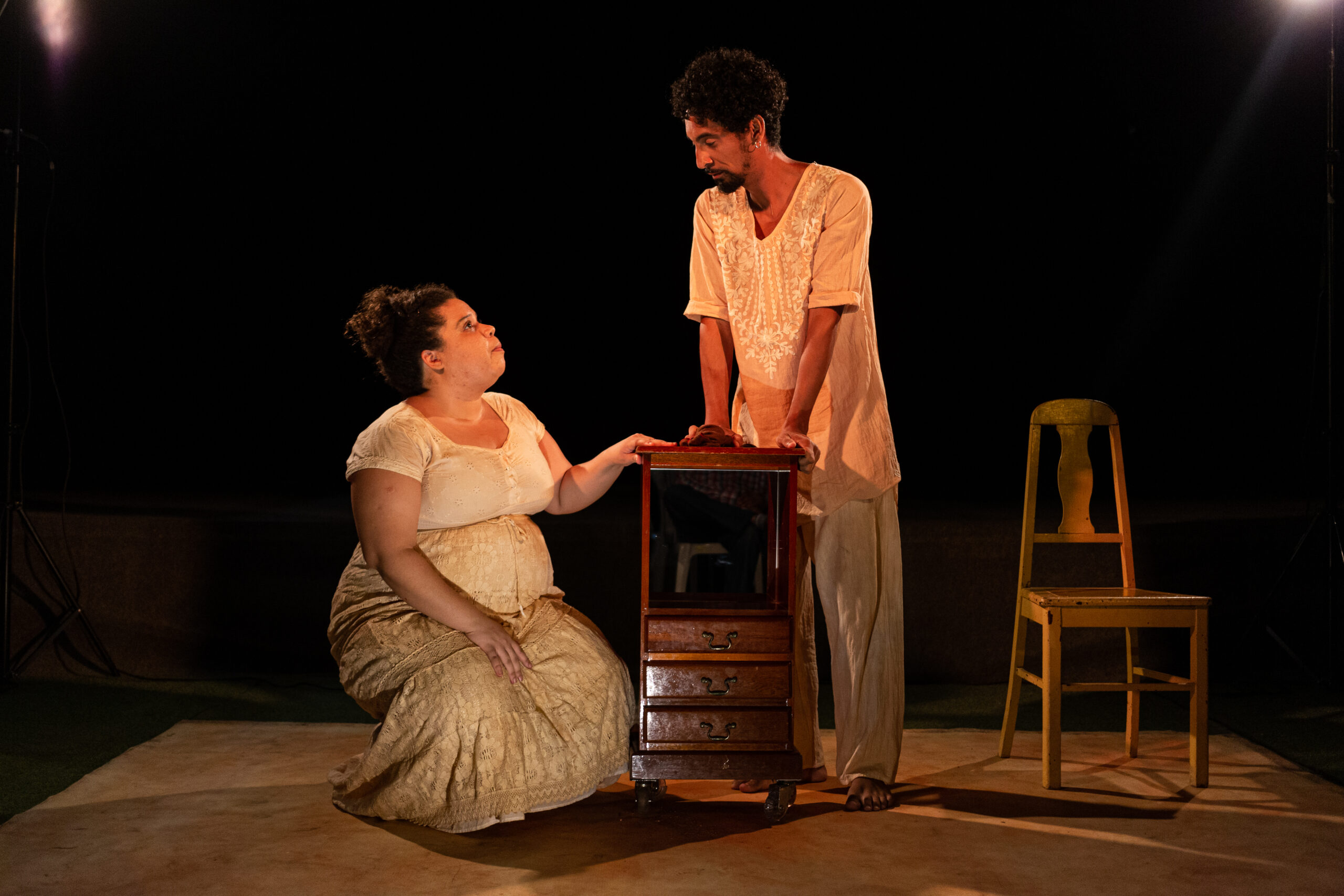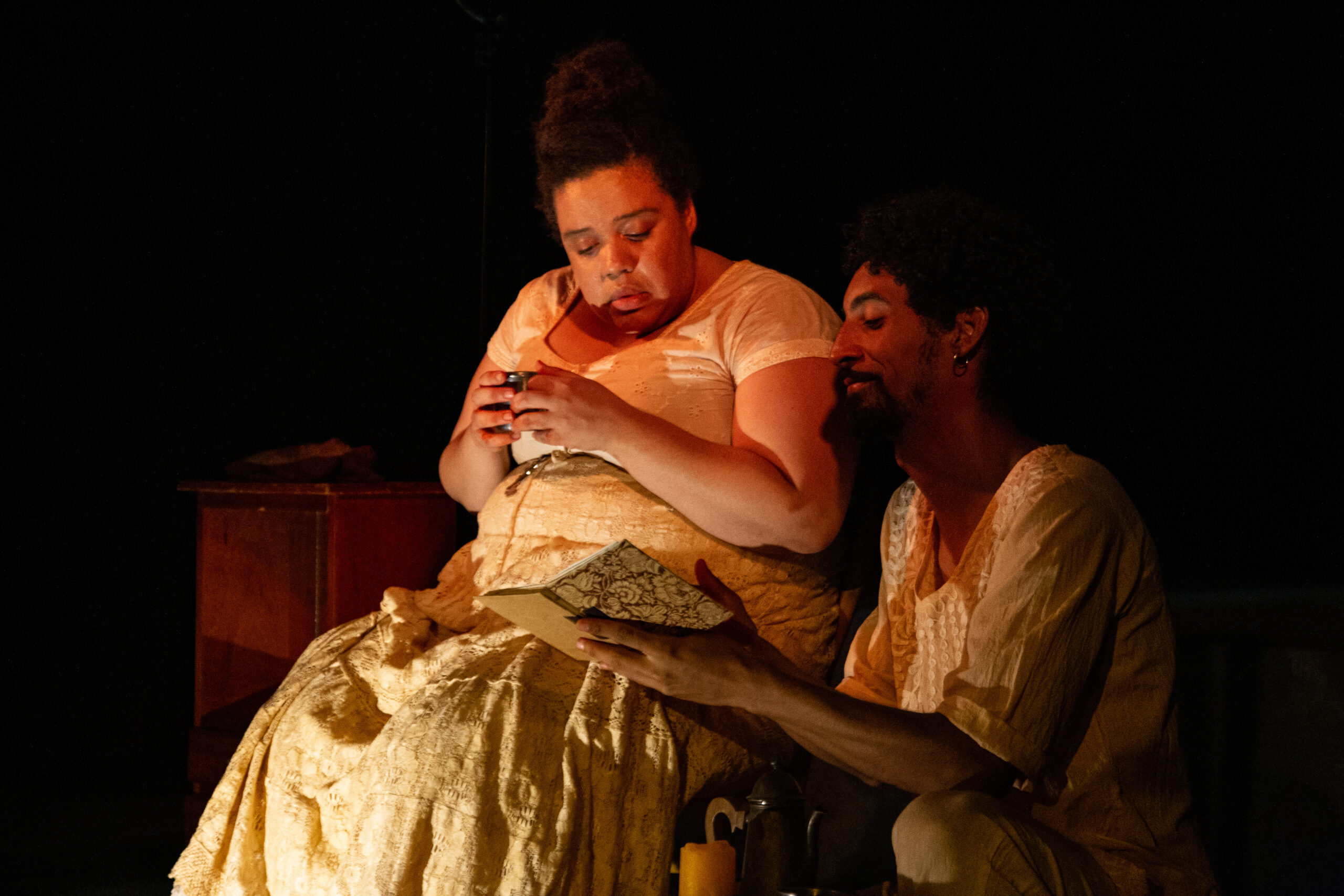
Pasmado is a new play exploring residents’ experiences of the forced eviction of the Pasmado favela, formerly located in the Rio de Janeiro South Zone neighborhood of Botafogo, during the 1960s. The play was written by Luiz Fernando Pinto, also one of the play’s directors, who was born and raised in Vila Aliança, a favela in Rio’s West Zone, where many of the Pasmado residents were relocated. The play was developed from residents’ accounts and draws on Pinto’s family history as his grandparents were residents of the former Pasmado community. It was crafted and performed by the Peneira Cultural Association which delivers artistic and cultural initiatives based on the interactions and interpersonal relationships of day-to-day life in Rio de Janeiro.
The play premiered in December 2022 with five different laje (favela rooftop terrace) performances across Vila Aliança. The free community-based performances in December included a post-play dinner with residents, cast, and production team to stimulate discussion and reflect on the play’s themes. According to Pinto and his co-director Priscila Bittencourt, it was essential to bring theater to a peripheral area of the city which rarely receives performing arts and culture. Following the community-based premieres, the play was performed at the Teatro Café Pequeno in Leblon, in Rio’s South Zone, over the first two weekends of February 2023.
Remembering the Pasmado Eviction through Art

In 1964, the Pasmado favela, like many other communities in the city’s affluent South Zone, was subject to a violent “sanitation operation,” orchestrated by then Guanabara State Governor Carlos Lacerda. As part of the forced eviction, the city’s fire department supervised a “controlled” fire that consumed the community destroying over 500 homes and, according to residents, claiming thousands of lives.
Directed and performed by descendants of former Pasmado residents, the play focuses on the relationship between two siblings, Zezé and João, played respectively by Kamilla Neves and Anderson Barreto. However, there is a third, invisible character who drifts in and out of scenes: the voice of Dona Celina. These snippets are taken from original recordings of the matriarch who experienced the forced eviction and are a chilling reminder of the brutal event.
The opening scene features Dona Celina’s crackly voice over the buzz of engines and the street in the background as the elderly matriarch recalls her tangible memories of Pasmado: “What can I remember?… History is very difficult, isn’t it?”
Together, João and Zezé try to establish a link between their present situation and their past. This delicate relationship between the past and present is highlighted when João warns: “Be careful now! You could be standing on someone’s history [right now],” referring to the many areas in the South Zone today which have been built over demolished favelas.
As the play builds towards a climax, João begins to smell something in the air. Pacing around his sister who is oblivious, he repeats “Can you smell that?” Smoke begins to drift onto the stage until the entire room takes on a burning red color and the sound of hissing and crackling becomes deafening.

Creative Memory: Understanding the City through the Past
For directors Bittencourt and Pinto, the play combines Pinto’s personal connections to Pasmado and Vila Aliança and Peneira’s overarching aim to investigate forms of artistic expression that highlight relationships between people, their memories, and communities. Since 2018, Peneira has begun the process of constructing a personal and emotional archive of different parts of Rio de Janeiro. Their first project took place on Rua Joaquim Silva in Lapa, in Centro, with 18 different people, including Dona Marlene, whose voice can be heard throughout the play, recounting their experiences with people and places in Rio. Bittencourt commented how:
“Generally, when people talk about a city, they speak about projects, streets, architecture. We are speaking from the micro perspectives of the powerless. Well, it’s the small things, the everyday relationships between people and their memories.” — Priscila Bittencourt
Pinto reaffirmed this point stating that a goal of Peneira is this creation of an artistic archive about the city:
“The construction of the city is so linked with this process of eviction, with many of the communities that have grown in Rio a product of this process of eviction.” — Luiz Fernando Pinto
The play, and indeed the very activity of narration, is then an active process of revisiting these stories and dealing with the often troubling memory they bring with them. Barreto, who plays João in the play, recounts how acting for him is a process of returning to his past, pointing to the red mud stains on the floor of the stage as “bringing memories of childhood, memories of home.”
The play not only looks backwards to what has happened, but is inextricably linked to the contemporary context of Vila Aliança and the West Zone. Hellowa Corrêa, a resident of Realengo, West Zone, is a journalist who attended performances both in Vila Aliança and Leblon. Talking to Corrêa and the directors, they spoke about how the play “affected every carioca,” and pointed to the young favela residents in the audience who, although not directly affected by the evictions in Pasmado, don’t have access to these kinds of cultural facilities or theaters and might be threatened with other eviction processes in the city today. Corrêa highlighted the profound sense of territory and space evoked by the performance.
“I’m a resident of the West Zone, and it seems to me that, in the play, the space itself is a character as well. In Vila Aliança performances, this was a very strong perception.” — Hellowa Corrêa

By reviving the memory of a forgotten Rio favela and exploring the ramifications of this brutal eviction in the present—and bringing this artistic expression to the communities that were directly affected—the Pasmado play creates a space to connect, understand, and ultimately help resist the discriminatory processes which continue to shape the city of Rio.
